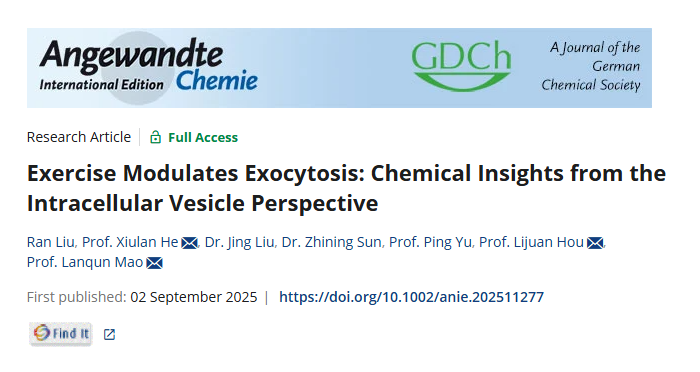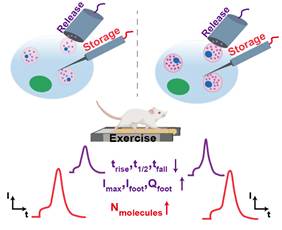Professor Mao Lanqun's Team from the College of Chemistry Published an Article in Angewandte Chemie International Edition
Recently, professor Mao Lanqun's team from the College of Chemistry published an article titled Exercise Modulates Exocytosis: Chemical Insights from the Intracellular Vesicle Perspective in Angewandte Chemie International Edition. This work provides fundamental chemical insights from the intracellular vesicle perspective into how exercise improves vesicle secretory function, suggests that exercise enhances neurotransmitter storage and release by upregulating exocytosis-associated proteins (i.e., F-actin, myosin II, VAMP, SNAP-25, and Munc-18) and increasing calcium influx.


The abstract is shown below:
The systemic benefits of exercise are partially attributed to exerkines release via extracellular vesicles, prompting extensive research on the effects of exercise on these vesicles. However, whether and how exercise modulates intracellular vesicle chemistry (e.g., neurotransmitter storage and exocytotic dynamics) remains unclear. Clarifying these mechanisms is essential to understanding how exercise influences exocytosis-associated physiological and pathological processes. In this study, by using single-vesicle electrochemistry, we reveal that exercise modulates intracellular vesicle chemistry by enhancing the neurotransmitter storage capacity, increasing the neurotransmitter release, and shortening the exocytosis events, while slightly reducing the fraction of release. Mechanistic studies suggest that these changes are likely due to the upregulation of certain exocytosis-associated proteins (i.e., F-actin, myosin II, vesicle-associated membrane protein, synaptosomal-associated protein 25, and mammalian uncoordinated-18) and the increase in the calcium influx. These findings provide valuable chemical insights into the beneficial effects of exercise from the intracellular vesicle perspective.
Reference: https://doi.org/10.1002/anie.202511277


